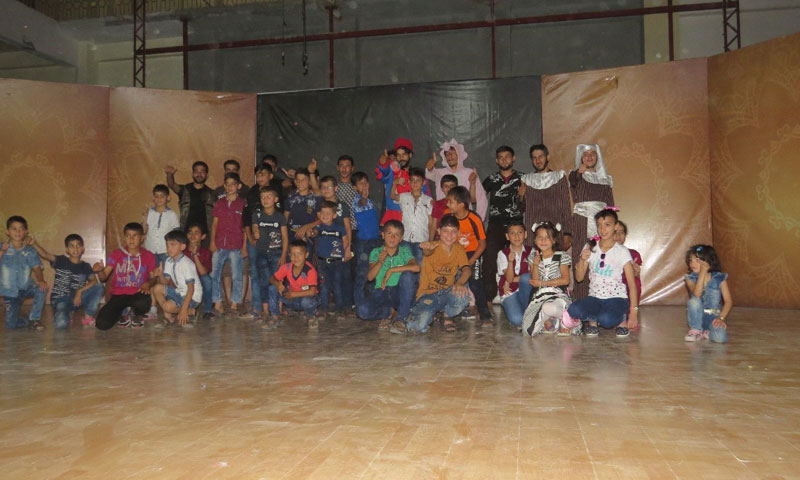With humble resources, a small group of Syrian young men seeks to give theater its soul back in Idlib, the governorate stigmatized for being controlled by extremist factions.
In the fifties of last century, theater in Idlib had a strong presence, especially that television was not yet available in Syria, due to which people resorted to theater for entertainment.
The Syrian writer Khatib Badleh speaks to Enab Baladi about the beginnings of theater in his city Idlib, saying that “Marwan Fanari was the father of theater in Idlib, in addition to a large number of actors from the 1950s and 1960s. Riyad Naasan Agha also wrote for theater there. The plays were presented in the open air at times and in closed locations at other times.”
The theatrical movement in Idlib continued with its founder Marwan Fanari to a recent point prior to the break out of the Syrian revolution; plays were presented in the city’s cultural center. The “city’s theatrical experience” has created a number of actors, who then were featured in the Syrian drama, such as Ausama al-Sayed Yousef, famous for Aleppian series, Badleh adds.
Young Men Revive Theater in Idlib
In an attempt to polish the theatrical tradition in the city, a group of young men constituted a theater team called “Nour al-Sham” and finally succeeded in putting the “Governor and the Fisher Man” play on stage, directed by Abood al-Shami.
Al-Shami, who studied theatre in Damascus and was displaced to Idlib, describes his experience with theater, along with 12 young men, who the circumstances failed to prevent from achieving their dream or expressing their talents.
“We presented our play on the stage of the Cultural Center in the city of Idlib, during the three days of Eid al-Fitr, following the preparations that took months, with the support of the Ministry of Education under the Salvation Government,” al-Shami says.
About the play, al-Shami says that it speaks of love and tolerance and that this theatrical initiative comes within the frame of these young people’s efforts to revive theater and the cultural movement in Northern Syria after years of absence, amidst the tragic conditions under which the northern parts of Syria have been enduring.
The team consists of a group of young men, without women members. The feminine element’s absence is one of Idlib’s dilemma’s even before the spread of the different military formations, which are today limiting women’s actions. The stage never witnessed a women participation since its foundation in Idlib. Writer Khatib Badleh says, “For the plays where a woman character is featured, an Aleppian actress would have been summoned for there are no actresses in Idlib. The only actress there was Ahed Fanari, who never acted in Idlib, and sometimes she performed out of Syria.”
The “Salvation Government” is the entity concerned with the management of the institutions in the city of Idlib since 2017, after it expelled the Interim Government, accusing it of affiliation to the extremist “Hay’at Tahrir al-Sham.”
Life Goes Back to the Cultural Center
The Cultural Center remained closed until a group of Idlib University students opened it early 2018. “The Governor and the Fisher Man,” is Idlib’s and the Cultural Center’s first play since the opposition controlled the city in March 2015.
About the Center’s upcoming events, the Director of the Cultural Center in Idlib, Fayz Qaserah, tells Enab Baladi that the team will be working on the latest stories by doctor Mustafa Abdelfattah.
Mustafa Abdelfattah is a doctor and a literary figure from Idlib; he has always played a fundamental role in the activation of the literary and artistic movement in the governorate while he writes children literature. He won many awards for his creation in the field, on top of which there is his masterpiece “Mother Nature” which is being taught as an appendix to the Gulf Cooperation Council’s curricula.
“We are facing several challenges in relation to theater, especially the lacking sound, lighting devices and the stage screen,” he says.
“Nour al-Sham” team will be presenting other plays in the “Diaa” Cultural Foundation.

